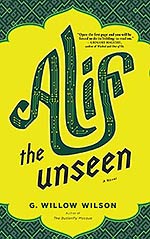
![]() everythinginstatic
everythinginstatic
1/1/2016
![]()
As I kept on reading through Alif the Unseen, I found myself constantly going back and forth on the genre. The language is beautiful, by turns intriguing and fast-paced, as I felt myself drawn into the oppressive world of the City, with its all-seeing Hand. Alif is one of the hackers trying to keep his clients' identities far away from the Hand and prove to Intisar that he is the right man for her; that her money doesn't matter, that his status as a mixed-race, unwanted son is not going to hold her back. But Intisar is promised to another man and when Alif builds a piece of software to block himself from her in the online world, he sets in motion a chain reaction that sees him cross the boundary between worlds and flee for his life, seeking allies in the most unlikely of places.
The biggest strength of the book, by far, is the worldbuilding. The City is incredibly interesting and although obviously based on an amalgamation of Gulf countries, what I really ended up enjoying about it was its universal status of police state. But Wilson's decision to set it in an Islamic country really adds a depth to the whole situation, as Alif's choices and problems are all tightly connected with Islam and its adepts and myths. As a Muslim herself, Wilson is able to delve deep into the various aspects of Muslim culture and fantasy; her unseen world of effrit, djinn and marids is captivating and completely alien culture, to the point where I was completely lost and determined not to leave.
The concept of the Alf Yeom and its implications in computing was interesting, but I did find it difficult to follow at times and it felt a little bit as if Alif's skills were greatly exaggerated. Yes he was a good hacker according to everyone else, but the way he used the Alf Yeom was never properly explained. Okay, we're now inventing a way of looking at computing that makes computers understand metaphor. And we do this using an ancient book with a framing device for its narrative and a whole bunch of stories on marriage. But... how? How is Alif able to read this and turn it into code? What's the whole tower about? Is this basically a demon summoning?
My other issue was the treatment of female characters. Dina is the best realised of the lot and I liked her approach to her veiling and her treatment of it as what it is: a choice that belongs only to her and has nothing to do with modesty or patriarchal pressure. In fact, she expressly goes against the wishes of her parents, which I found to be an interesting little aside. Sadly, she is the only one who genuinely made any sense. Intisar very quickly slips into the role of "mysterious woman who holds the key to it all" and I felt that, more than anything, her reactions at the end of the novel were simply childish. Alif's feelings towards her are the main driver of the novel but ultimately they are resolved far too quickly and easily. And finally, the American convert who is given no name and whose relationship with the other characters (and Vikram in particular) is just nonsensical. Once she fulfils her plot purpose she simply seems to hang around and Wilson makes no effort to engage the reader in her story and motivations. Ultimately, she just feels like a waste and a disappointment.
In its moments of brilliance, Alif the Unseen is a cracking read about the power of the state and censorship, about the defiance that comes from wanting to be free (whatever shape that freedom may take) and also about the power of stories in a world which has stopped believing. While there are flaws, I did find myself enjoying the story and in future, I will seek Wilson's work on the Ms Marvel comics. I urge that you do the same.